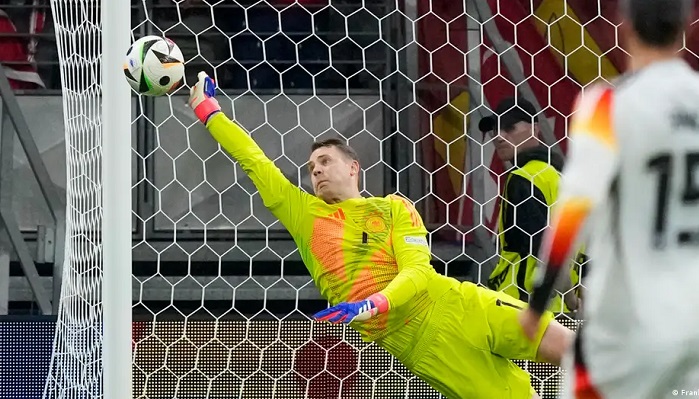
As the European Championship in Germany reaches the final stages, it's not only the winner that's undecided but whether the event has lived up to the claim that it was the most sustainable in the tournament's history.
The great sustainability pledge made by UEFA, European football's governing body, was never going to be an easy one to fulfill. Large international sporting events tend to come with a built-in carbon footprint, and Euro 2024 is no exception.
"I think the problem of sport is that it would be most environmentally friendly when there would be no sporting event," said Pamela Wicker, a professor for sport management and sport sociology at Germany's Bielefeld University. Yet, given their positive social impacts, she advocates for running them "in a way that is more environmentally sustainable and economically sustainable."
But how easy is that? Germany's environmental think tank, Öko-Institute, predicts that by the time the final Euro 2024 whistle blows in mid-July, the month-long tournament will have produced around 500,000 tons of carbon dioxide (CO2), equivalent to the annual emissions of 120,000 cars.
Some 80% of that final carbon footprint is expected to be transport-related, two-thirds of it from the air traffic that has flown fans and players to and from matches. This is despite Germany's efforts as the host nation to move fans off planes and onto trains.
Discounts and showing the way
Leading by example and joined by Switzerland and Portugal, Germany pledged its national team would keep flying to a minimum throughout the contest. Organizers also teamed up with continental and domestic rail providers to incentivize the traveling public to stay on the ground.
"The Interrail pass Euro 2024 is a special pass, an exclusive product, for match ticket orders and is valid for a roundtrip journey from 32 European countries,” said Silvia Festa, Senior Business Development Manager with Eurail, which markets Interrail passes.
And once actually in Germany, no matter how they arrived, all Euro 2024 ticketholders have been able to make free use of Germany's regional public transport network for 12 hours a day.
"I think that's a really, really good first step," said Benja Faecks, carbon market expert with nonprofit watchdog Carbon Market Watch. But Öko-Institute researcher Hartmut Stahl said while it was a "good idea," organizers had missed a trick.
"What obviously would be the best solution to have," he said, was "free tickets all over Germany. That would be real progress."
In some venue cities, including Berlin, Hamburg and Leipzig, there is no public parking near the stadium, potentially making driving to matches less appealing.
Infrastructure and energy
UEFA has also been pushing for sustainable football infrastructure, including using renewable energy to power football arenas and reduce energy-intensive floodlight usage. Emissions aside, efforts have been made to reduce water use by introducing gray water — untreated household wastewater that has not been contaminated by sewage.
The final analysis on the success of these measures won't be known until after after the final and everyone has gone home. However, it's not only fan behavior that will determine whether this has, in fact, been a sustainable tournament. Infrastructure is also part of the equation.
"To make these major sporting events more sustainable, one key aspect is to use existing infrastructure, existing stadiums, or to have a follow-up usage for anything that is built," Pamela Wicker, a professor for sports management and sports sociology at Germany's Bielefeld University, told DW.
Germany scores highly for hosting all Euro 2024 matches in 10 preexisting arenas that will be in use for many more years to come. By contrast, Qatar built seven brand new stadiums for the 2022 World Cup, which, according to research by Carbon Market Watch, generated CO2 emissions to the tune of 1.6 million tons. That's three times the predicted carbon footprint of the entire UEFA Euro 2024.
Funding the future sustainability of football
In a novel move, UEFA also set up a carbon fund into which it is paying €25 ($26.78) for every ton of CO2 emissions produced during the tournament.
The fund, which, based on pre-tournament projections, will amount to €7 million, will be used to help German amateur football teams become more sustainable through installing things like like energy-efficient LED floodlights, solar panels and heat pumps.
Hartmut Stahl praised the initiative as an alternative to carbon off-setting schemes that compensate for emissions generated by buying into sustainability projects elsewhere in the world.
"The idea is that the money is no longer spent for buying certificates," he said. "But instead, the funds are given to clubs in Germany because there are so many that have problems with their facilities; they have to make renovations. Energy efficiency is a big issue there."
Critics, however, argue that €7 million is nothing compared to UEFA's expected revenue of over €2 billion from the tournament.
Showing the way forward
Beyond the immediate impact of the tournament, where on UEFA's recommendation, plant-based food is on sale alongside meat products with a higher carbon footprint, Alice Ainsworth of the nonprofit Carbon Trust said athletes also play a role in inspiring fans to adopt more eco-friendly lifestyles.
"If you see your sporting hero choosing to consume less meat or opting to avoid domestic travel or lead a more sustainable life, that can have a really significant positive impact on an individual's lifestyle choices," Ainsworth said.
But Wicker doesn’t think it’s realistic to expect a four-week tournament to stir great social and environmental changes.
"It cannot make everybody more sustainable during this period of time. But it can, of course, create some initial changes," she said. "It can be a starting point for many people when it's in the media and on television for one month."